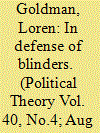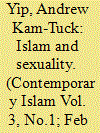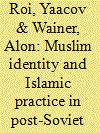| Srl | Item |
| 1 |
ID:
106172


|
|
|
| 2 |
ID:
113884


|
|
|
|
|
| Publication |
2012.
|
| Summary/Abstract |
Kant's progressive philosophy of history is an integral aspect of his critical system, yet it is often ignored or even treated as an embarrassment by contemporary scholars. In this article, I defend Kant and argue for the continuing relevance of his regulative assumption of historical progress. I suggest, furthermore, that the first-person stance of practical belief exemplified in Kant's conception of hope offers new resources for thinking about the relationship between the ideal and the real in political theory.
|
|
|
|
|
|
|
|
|
|
|
|
|
|
|
|
| 3 |
ID:
087286


|
|
|
|
|
| Publication |
2009.
|
| Summary/Abstract |
Academic and popular discourses of Islam and Muslims, particularly within the
Western context, tend to focus on macro issues such as multiculturalism, community
integration, political management, and governmental policies. This scenario is
primarily propelled by the geopolitical sensitivities surrounding a key question-
what Turner (2007: 123) has called 'the management of Muslims'. Under this
climate, some may consider the examination of sex and sexuality inconsequential
and insignificant, at best an endeavour within the confines of theology and ethics
(good works in this area include e.g. Ali 2006; Wadud 2006). Yet, as scholars such
as Plummer (2003) and Richardson (2000) have rightly pointed out, although issues
about sexuality are seemingly personal, private, and intimate, they have a significant
public and policy dimension because they are related to our status and rights as
citizens, thus inextricably linked to other aspects of social life. I am therefore
grateful to Gabriele Marranci for inviting me to edit this special collection which
aims to illuminate a grossly under-studied aspect of Muslim lives.
|
|
|
|
|
|
|
|
|
|
|
|
|
|
|
|
| 4 |
ID:
103136


|
|
|
|
|
| Publication |
2009.
|
| Summary/Abstract |
After the dissolution of the Soviet Union, the newly independent countries of Central Asia had the opportunity to endorse religious freedom. Nevertheless, they chose for the most part to continue the policy of monitoring religious activity, on the pretext of protecting their countries from radical Islam. This study focuses on Islamic praxis in post-Soviet Central Asia. Based on a survey conducted in four Central Asian successor states (excluding Turkmenistan), it examines everyday Islam - observance of precepts, life-cycle rites, prayer and mosque attendance - as well as people's perceptions about the role of Islam in their lives and in the evolution of their societies and the place of Islam in local identity. The authors' findings have not always corresponded to usually accepted hypotheses and they have sought to analyse the reasons for this. Undoubtedly, the exigencies of the current political situation both act as a restraint on respondents in addressing the questions put to them and restrict their religious praxis outside the home. It is difficult to assess how far responses would have differed had the survey been conducted under more favourable circumstances; indeed, some of the questions may have been genuinely misinterpreted as a result of differences in outlook and the use of concepts.
|
|
|
|
|
|
|
|
|
|
|
|
|
|
|
|